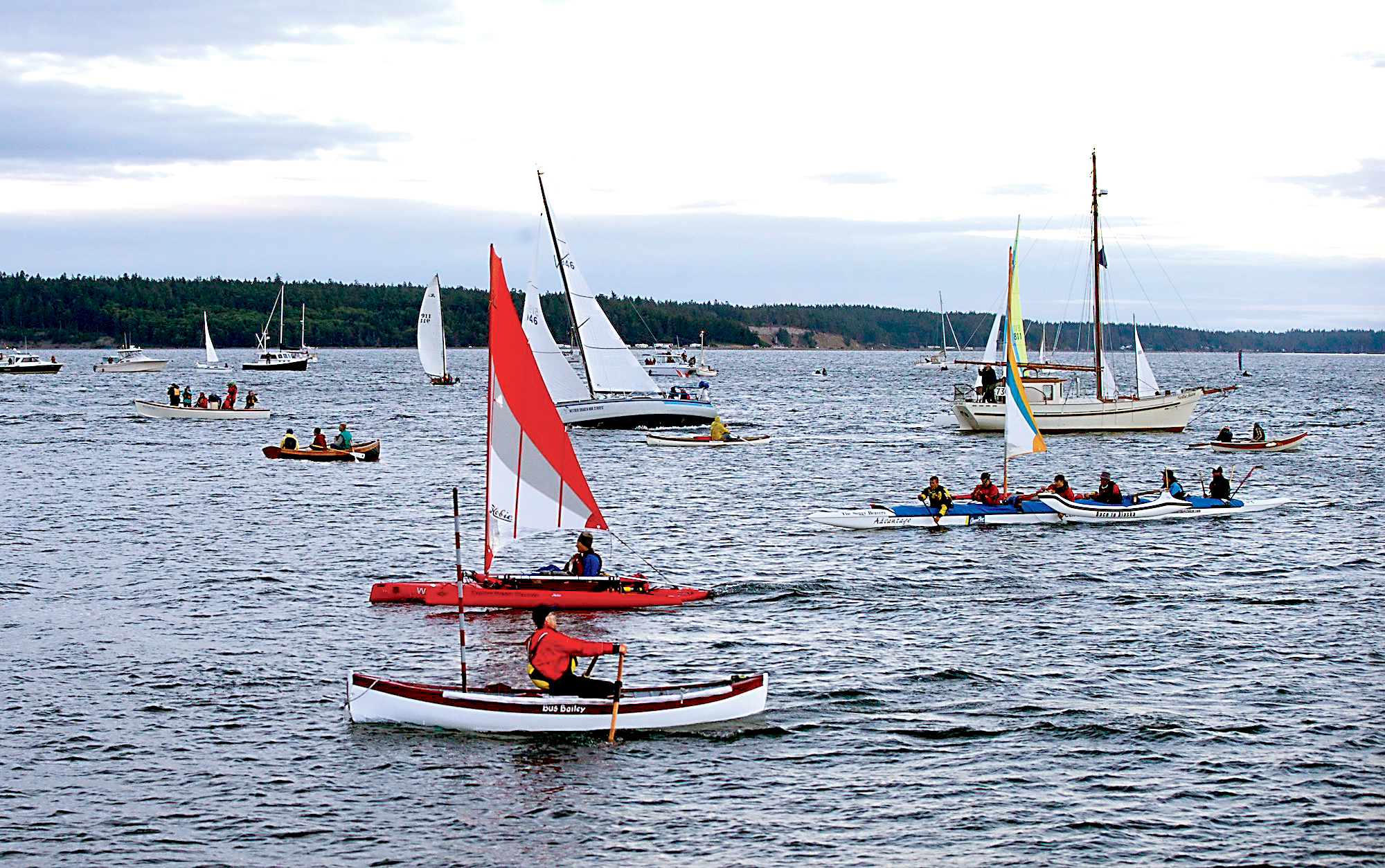PORT TOWNSEND — More than half of the 53 motorless watercraft that embarked Thursday morning on the first leg of the inaugural 750-mile Race to Alaska had arrived in Canada by late afternoon.
During the race, live updates and tracker information are available at www.r2ak.com.
Stage 1 of the race stretches from Port Townsend across the Strait of Juan de Fuca — passing through two heavily trafficked shipping lanes and the Canadian border — to Victoria.
It’s about 40 miles with a lot of exposure and strong currents.
Stage 2, which will begin at noon Sunday from Victoria, will be to Ketchikan, Alaska.
As of 4:30 p.m. Thursday, about 29 racers had made it to Victoria Harbour.
Another 10 had dropped out, including one man whose vessel capsized at about 8:22 a.m., according to Carrie Andrews, communications manager for the Northwest Maritime Center in Port Townsend, the starting point for the boats at 5 a.m. Thursday.
The man whose boat capsized, Mark Dussell, was uninjured when his TriRaid 560 trimaran, which was equipped for rowing, went under.
“A Coast Guard auxiliary answered the original call for assistance and provided towing service with [the] skipper on board,” Andrews said.
A Jefferson County Sheriff’s Office boat crew later picked up Dussell since his craft continued to take on water.
The mostly submerged vessel was brought to shore, where Dussell picked it up, she said.
A vessel support system in place to help stranded participants such as Dussell “worked flawlessly,” Andrews said.
Other racers also didn’t make it to Canadian waters before sundown.
“We have a couple that are on [the U.S.] side of the Strait still that are likely to camp overnight and make a run for it in the morning,” Andrews said.
“Everybody else is at least through the shipping lanes and within spitting distance of Victoria at this point.”
Those yet to arrive in Victoria have until 5:30 p.m. today to get there — 36 hours after leaving the maritime center.
The race from Port Townsend to Ketchikan — organized by Jake Beattie, director of the maritime center — has drawn rowers, sailors, canoers and kayakers from across the country to compete in a contest that only has a few rules: no motors allowed and no help once you start.
Team Golden Oldies, a six-member crew aboard a 38-foot multi-hull sailboat, was the first to arrive at the Stage 1 finish line in Victoria after about four hours of racing.
They soon were followed by two other sail teams: Team Elsie Piddock and Team MOB Mentality.
Once the Stage 1 racers finish, they’ll have to wait until Sunday to begin again and head for Alaska.
Of those who opt to compete in the entire race, the first to reach Ketchikan will take home $10,000.
Second place gets a set of steak knives. Everyone who enters gets a T-shirt and bragging rights.
The vessels entered in the race range from 10-foot rowboats to sailing kayaks to a 38-foot catamaran, Beattie said.
Stage 1 is designed as a shake-down and weed-out, Beattie said.
“Some plan to use the first race to decide what they want to do in the next couple of weeks,” Beattie said.
Therefore, the starting list for Stage 2 — the rest of the race — won’t be known until Sunday.
Beattie said the race now has about 120 people on about 54 or 55 teams.
Among the racers is Washington native Colin Angus, who was named the National Geographic Adventurer of the Year in 2008 for his human-powered circumnavigation of the Earth.
He is in a specially designed boat.
Brothers Nels and Lars Strandberg are skipping the sails and will be paddling their way with Viking oars.
Team Blackfish is competing on a trimaran — a three-hulled sailboat — that was redesigned with 14-foot oars.
Racers are expected to arrive in Alaska by July 4.
________
Sequim-Dungeness Valley Editor Chris McDaniel can be reached at 360-681-2390, ext. 5052, or cmcdaniel@peninsuladailynews.com.
The Associated Press contributed to this report.

